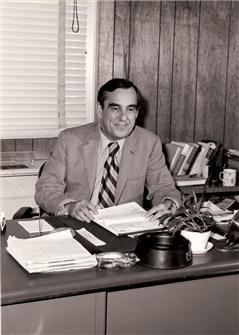
A SPECIAL TRIBUTE
George Henry Orvin, M.D., Professor Emeritus
August 6, 1922 - August 29, 2014
2014 By Elizabeth (Libby) Riddle

Dr. George Orvin passed away Friday, August 29 at age 92. With him went much of the best and most colorful history of the Department of Psychiatry and the Medical College of South Carolina. Dr Orvin was among the old time physicians who understood the healing power of his relationship with his patients. After finishing medical school, Dr. Orvin practiced general medicine for 10 years and realized that much of his practice was psychiatry. He then returned to training, and completed a psychiatry residency, at both MUSC and the Maudsley Hospital in London.
He joined the MUSC Department of Psychiatry faculty in 1961. Dr. Orvin gradually devoted more and more of his attention to the treatment of adolescents and their families, and established the eight bed adolescent inpatient unit, 10-North, in 1967. He was appointed Acting Chairman of the Department of Psychiatry in 1982, and was made Professor Emeritus in 1993.
Dr. Orvin creatively used the ideas of Peter Blos, M.D., Erik Erikson, and Donald Rinsley, M.D. among others, to develop a well structured adolescent inpatient treatment program that included individual, group, and family therapies.
He adapted* Peter Laqueur, M.D.s multifamily group therapy to the treatment of adolescents and their parents and is regarded as a pioneer in the practice of this modality. Dr. Orvin strongly believed in the necessity of maintaining a healthy milieu for effective treatment, and expected faculty, trainees, and staff to attend a weekly problem solving process group led by him. As he stated All other therapies will fail if the ward milieu is not also therapeutic
Among his publications of which he was most proud are Intensive Treatment of the Adolescent and His Family published in the Archives of General Psychiatry in 1974, and his book, Understanding the Adolescent, published in 1995.
Dr. Orvins approach to patient care was grounded in psychodynamic theory, life experience, pragmatism, and good common sense.
Dr. Orvins legendary talks on adolescent development frequently began with the opening lines from Moby Dick, Call me Ishmael I account it high time to get to sea to illustrate the inner turmoil of the adolescent stage of development. He was a master of oration, and his use of stories to teach important points was one of his most memorable talents.
Teaching was Dr. Orvins passion, and he left a rich legacy of knowledge to psychiatry residents, psychology interns, and students of social work, nursing, and other disciplines who were fortunate enough to have him as their teacher and mentor. As former student and colleague, Robert P. Archer, Ph.D. said, George always preferred to encourage and support the best parts of us all I continue to emulate him.
Connie Best, Ph.D. remembers him as always so kind always interested in working with those who were just beginning in the profession and who wanted to learn.
Colleagues had no doubt where Dr. Orvin stood on important matters. His patients, his staff, and his fellow faculty loved him and respected his unabashed ability to be who he was even when his ideas and opinions were different from prevailing thought. As Pam Thompson remembers he was well loved by everyone who had the honor and pleasure of working with him.
Dr. Orvin could be heard coming down the halls of the tenth floor due to the clicking of the taps on his shoes. He always dressed in dapper style in a three-piece suit, dress shirt with cufflinks, and a carnation boutonniere. His bowler hat was his signature. As colleague Jerry L. White, Ph.D. described him, George was a consummate Southern gentleman who dressed like a London barrister.
Dr. Orvin loved life and lived it fully and well. He loved being a physician, and demonstrated the utmost professionalism in his kindness and compassion for colleagues and the adolescents and families he treated. In Dr. Layton McCurdys words on hearing of Dr. Orvins death, He was a wonderful character always with a positive word to say about other people. It is hard to imagine a world without George Orvin.
Farewell our beloved colleague, mentor and friend, Elizabeth Libby Riddle, MSW, LISW
*Dr. Orvin said in a video interview with Lewis N. Foster in 1994 that he didnt know about H. Peter Laqueur, MD or his work in multiple family therapy groups when he began to pull families together to talk and answer questions in his clinic.